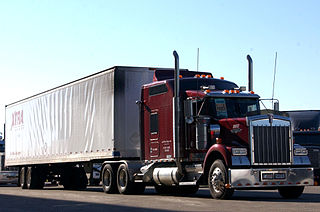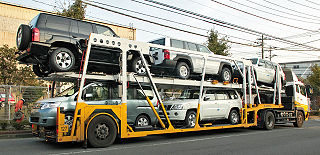Related Research Articles

Sex trafficking is human trafficking for the purpose of sexual exploitation. It has been called a form of modern slavery because of the way victims are forced into sexual acts non-consensually, in a form of sexual slavery. Perpetrators of the crime are called sex traffickers or pimps—people who manipulate victims to engage in various forms of commercial sex with paying customers. Sex traffickers use force, fraud, and coercion as they recruit, transport, and provide their victims as prostitutes. Sometimes victims are brought into a situation of dependency on their trafficker(s), financially or emotionally. Every aspect of sex trafficking is considered a crime, from acquisition to transportation and exploitation of victims. This includes any sexual exploitation of adults or minors, including child sex tourism (CST) and domestic minor sex trafficking (DMST).

Human trafficking and the prostitution of children has been a significant issue in the Philippines, often controlled by organized crime syndicates. Human trafficking is a crime against humanity.

The trucking industry serves the American economy by transporting large quantities of raw materials, works in process, and finished goods over land—typically from manufacturing plants to retail distribution centers. Trucks are also used in the construction industry, two of which require dump trucks and portable concrete mixers to move the large amounts of rocks, dirt, concrete, and other building materials used in construction. Trucks in America are responsible for the majority of freight movement over land and are tools in the manufacturing, transportation, and warehousing industries.

Contemporary slavery, also sometimes known as modern slavery or neo-slavery, refers to institutional slavery that continues to occur in present-day society. Estimates of the number of enslaved people today range from around 38 million to 49.6 million, depending on the method used to form the estimate and the definition of slavery being used. The estimated number of enslaved people is debated, as there is no universally agreed definition of modern slavery; those in slavery are often difficult to identify, and adequate statistics are often not available.

Human trafficking is the trade of humans for the purpose of forced labour, sexual slavery, or commercial sexual exploitation. Human trafficking can occur within a country or trans-nationally. It is distinct from people smuggling, which is characterized by the consent of the person being smuggled.

The portrayal of the trucking industry in United States popular culture spans the depictions of trucks and truck drivers, as images of the masculine side of trucking are a common theme. The portrayal of drivers ranges from the heroes of the 1950s, living a life of freedom on the open road, to the depiction of troubled serial killers of the 1990s. Songs and movies about truck drivers were first popular in the 1940s, and mythologized their wandering lifestyle in the 1960s. Truck drivers were glorified as modern day cowboys, outlaws, and rebels during the peak of trucker culture in the 1970s.

In the United States, human trafficking tends to occur around international travel hubs with large immigrant populations, notably in California, Texas, and Georgia. Those trafficked include young children, teenagers, men, and women; victims can be domestic citizens or foreign nationals.

ECPAT International is a global network of civil society organisations that works to end the sexual exploitation of children. It focuses on ending the online sexual exploitation of children, the trafficking of children for sexual purposes, the sexual exploitation of children in prostitution, child, early and forced marriages, and the sexual exploitation of children in the travel and tourism industry.

Nefarious: Merchant of Souls is a 2011 American documentary film about modern human trafficking, specifically sexual slavery. Presented from a Christian worldview, Nefarious covers human trafficking in the United States, Western and Eastern Europe, and Southeast Asia, alternating interviews with re-enactments. Victims of trafficking talk about having been the objects of physical abuse and attempted murder. Several former prostitutes talk about their conversion to Christianity, escape from sexual oppression, and subsequent education or marriage. The film ends with the assertion that only Jesus can completely heal people from the horrors of sexual slavery.

An auto transport broker is a type of cargo broker that specializes in the shipping and transportation of vehicles. Most vehicles shipped in the U.S. are cars and trucks, but many brokers handle boats, RVs, motorcycles and other types of vehicles as well. Auto transport is classified as "specialized freight trucking" under NAICS code 484230.

The National Action Plan to Combat Human Trafficking is a four-year action plan that was established by the Government of Canada on June 6, 2012 to oppose human trafficking in Canada. In 2004, the government's Interdepartmental Working Group on Trafficking in Persons was mandated to create a national anti-human-trafficking plan, but the mandate went unfulfilled despite reminders from politicians and non-governmental organizations (NGOs). Member of Parliament (MP) Joy Smith put forward motion C-153 in February 2007 to put a plan in place, and the House of Commons passed it unanimously. Smith began developing a proposal and released it in September 2010 under the title "Connecting the Dots". University of British Columbia law professor Benjamin Perrin helped guide Smith's writing of the proposal. Before the establishment of the NAP-CHT, a variety of people and organizations—including the 2009 and 2010 Trafficking in Persons (TIP) Reports of the United States Department of State—criticized Canada for failing to have such a plan.
Stop Child Trafficking Now was a not-for-profit organization founded by Lynette Lewis, an author and public speaker. This nonprofit organization engaged in advocacy work in an attempt to bring an end to the trafficking of children. SCTNow targeted the demand for human trafficking, focusing on pedophiles, child abductions and child pornography. The group sought to have those who sexually abuse children prosecuted and convicted.
Timea Nagy is a Canadian activist who has spoken on behalf of victims of human trafficking. She founded Walk With Me, a Toronto-based organization that aids survivors of trafficking. Nagy was featured in an anti-trafficking campaign by the Salvation Army in 2009. Her activism has drawn upon her own experience of forced prostitution in Canada.

Not My Life is a 2011 American independent documentary film about human trafficking and contemporary slavery. The film was written, produced, and directed by Robert Bilheimer, who had been asked to make the film by Antonio Maria Costa, executive director of the United Nations Office on Drugs and Crime. Bilheimer planned Not My Life as the second installment in a trilogy, the first being A Closer Walk and the third being the unproduced Take Me Home. The title Not My Life came from a June 2009 interview with Molly Melching, founder of Tostan, who said that many people deny the reality of contemporary slavery because it is an uncomfortable truth, saying, "No, this is not my life."
Operation Stormy Nights was an early major anti-human-trafficking operation by the Federal Bureau of Investigation (FBI). Operations took place in Oklahoma and brought to light organized crime networks trafficking female minors along United States Numbered Highways, where the girls were forced into prostitution to service truck drivers.

Slavery is a system which requires workers to work against their will for little to no compensation. In modern-day terms, this practice is more widely referred to as human trafficking. Human trafficking is defined by the United Nations Office on Drugs and Crime as “the recruitment, transportation, transfer, harboring or receipt of persons, by means of the threat or use of force or other forms of coercion, of abduction, of fraud, of deception, of the abuse of power or of a position of vulnerability or of the giving or receiving of payments or benefits to achieve the consent of a person having control over another person, for the purpose of exploitation”. The practices of slavery and human trafficking are still prevalent in modern America with estimated 17,500 foreign nationals and 400,000 Americans being trafficked into and within the United States every year with 80% of those being women and children. Human trafficking in the United States can be divided into the two major categories of labor and sex trafficking, with sex trafficking accounting for a majority of cases.

Human trafficking in Nevada is the illegal trade of human beings for the purposes of reproductive slavery, commercial sexual exploitation, and forced labor as it occurs in the state of Nevada, and it is widely recognized as a modern-day form of slavery. It includes "the recruitment, transportation, transfer, harboring or receipt of persons by means of threat or use of force or other forms of coercion, of abduction, of fraud, of deception, of the abuse of power, or of a position of vulnerability or of the giving or receiving of payments or benefits to achieve the consent of a person having control over another person, for the purpose of exploitation. Exploitation shall include, at a minimum, the exploitation of prostitution of others or other forms of sexual exploitation, forced labor services, slavery or practices similar to slavery, servitude or the removal of organs."

Sex trafficking in the United States is a form of human trafficking which involves reproductive slavery or commercial sexual exploitation as it occurs in the United States. Sex trafficking includes the transportation of persons by means of coercion, deception and/or force into exploitative and slavery-like conditions. It is commonly associated with organized crime.
References
- ↑ "Arkansas to stop human trafficking". Hola! Arkansas. September 6, 2013. Archived from the original on September 28, 2013. Retrieved September 7, 2013.
- ↑ Abbie Alford (April 14, 2011). "The OATH to Expose Modern Day Slavery". KOKI-TV . Retrieved September 7, 2013.
- ↑ "Truckers: Help Fight Sex-Slavery". Today's Trucking . November 7, 2011. Retrieved September 7, 2013.
- ↑ "1,000 children in Ohio believed to be ensnared in commercial sex industry". Norwalk Reflector. August 26, 2013. Retrieved September 7, 2013.
- 1 2 "Truckers Take The Wheel In Effort To Halt Sex Trafficking". NPR. July 13, 2016. Retrieved March 27, 2018.
- ↑ "TAT_AR_1". online.flipbuilder.com. Archived from the original on 2021-04-12. Retrieved 2019-05-31.
- ↑ Sex Trafficking at Truck Stops
- ↑ "Pilot Flying J Supports Truckers Against Trafficking". Convenience Store News. November 7, 2011. Archived from the original on September 7, 2013. Retrieved September 7, 2013.
- ↑ Todd Dills (August 27, 2013). "TCA offers online certification course with Truckers Against Trafficking". Overdrive. Retrieved September 7, 2013.
- ↑ Tyler Davie (February 23, 2012). "Campaign to raise awareness of human trafficking coming to Ontario truck stops this spring". Truck News. Retrieved September 7, 2013.
- ↑ Todd Dills (August 17, 2013). "'Killer Truckers' TV special on re-air". Overdrive. Retrieved September 7, 2013.
- ↑ Dylan Woolf Harris (July 18, 2013). "Truckers Against Trafficking: AG enlists road warriors to battle illegal sex trade". Elko Daily Free Press. Retrieved September 7, 2013.
- ↑ "OBAC joins awareness campaign to fight human trafficking". Truck News. April 27, 2012. Retrieved September 7, 2013.